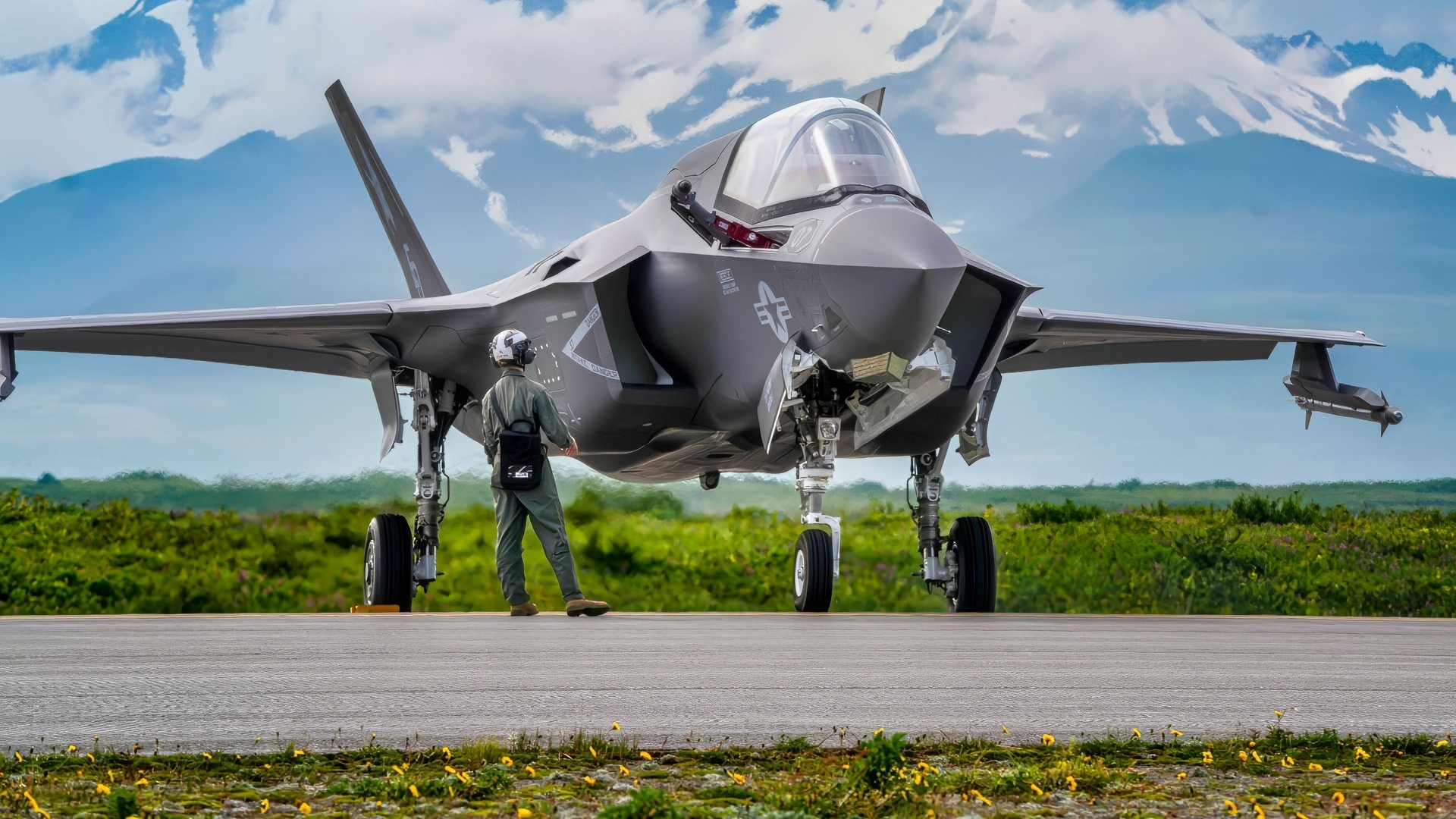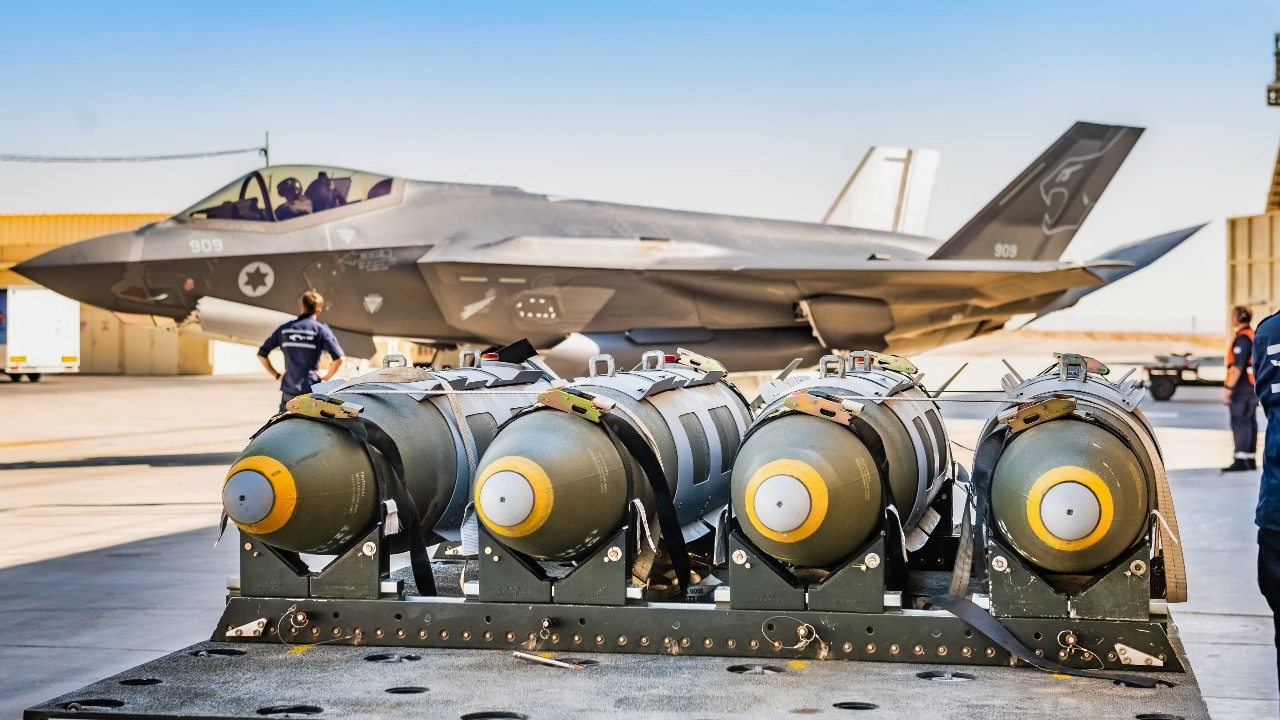Key Points and Summary – Saudi Arabia is finally set to receive F-35s after President Trump approved the long-sought sale during Crown Prince Mohammed bin Salman’s high-profile Washington visit.
-But the jets will arrive in a downgraded export configuration, stripped of the most advanced weapons, electronic-warfare tools, and customization rights that Israel enjoys with its F-35I Adir fleet.

A U.S. Marine Corps F-35B Lightning II Joint Strike Fighter assigned to Marine Corps Air Station Beaufort, parks on a runway for a forward armed and refueling point (FARP) for ARCTIC EDGE 2025, August 18, 2025, at Cold Bay Airfield, Alaska. AE25 provided Special Operations Command North the opportunity to test a range of capabilities and response options to deter, disrupt, degrade, and deny competitor activity in the Arctic in support of globally integrated layered defense of the homeland. AE25 is a NORAD and U.S. Northern Command-led homeland defense exercise designed to improve readiness, demonstrate capabilities, and enhance Joint and Allied Force interoperability in the Arctic. (U.S. Air Force photo by Airman 1st Class Gracelyn Hess)
-The move lets Washington deepen security ties with Riyadh without eroding Israel’s qualitative military edge, even as Jerusalem’s security establishment remains wary. With delivery years away, the deal underscores how U.S. software control, not just hardware, will define Middle East airpower hierarchies.
Downgraded F-35 Deal: What Riyadh Won’t Get From Washington
Earlier this week, during a visit to Washington by Saudi Arabia’s Crown Prince Mohammad Bin Salman, U.S/ President Donald Trump announced that the U.S. will indeed approve the sale of F-35 jets to Saudi Arabia.
The Saudis had been pushing for such a sale for a while, and it had been rumored in recent weeks that a deal was close.
The deal is controversial for several reasons, as CNN explains.
Saudi Arabia would become the first country that is not a democracy to receive F-35s. The country’s human rights record has been seriously questioned, and not only because of the 2018 killing of dissident journalist Jamal Khashoggi.
What Israel Thinks
There’s also the issue of Israel. The U.S. has long had a policy, enshrined in law, that Israel should maintain a “qualitative military edge” over other countries in the Middle East, and Israel has long been the only country in the region able to fly F-35s.
Israel has not objected out of hand to the Saudis receiving the F-35s, although it has proposed that the sale be conditioned on Saudi Arabia agreeing to normalization of relations with Israel.
“The deal was supposed to reshape the Middle East,” CNN wrote. “Israel would normalize relations with Saudi Arabia, paving the way for ties with the wider Muslim world. In exchange, the Saudis would get a US security package that includes F-35 stealth fighter jets – fifth-generation aircraft that would cement Riyadh’s relationship with Washington as it opened a new chapter with Israel. But, at least based on Trump’s public comments so far, only half of that package deal is likely to come to fruition.”

An Israeli F-35I Adir assigned to 140 Squadron, Nevatim Air Base, taxis out for a mission during Red Flag-Nellis 23-2 at Nellis Air Force Base, Nevada, March, 15 2023. Red Flag is an opportunity to build on the success of JUNIPER OAK 23-2, JUNIPER FALCON, and additional combined exercises to enhance interoperability with Israel, strengthen bilateral cooperation, and improve capabilities in ways that enhance and promote regional stability and reinforce the United States’ enduring commitment to Israel’s security. (U.S. Air Force photo by William R. Lewis
Trump did not mention Israel at all in the event with MBS. However, it appears a compromise was worked out that will keep the deal compliant with long-established practice.
Lacking in Features
According to a Reuters report on Thursday, the jets that will be sold to the Saudis will lack the “advanced features” that are on Israel’s version of the F-35s. The Reuters report cited U.S. officials and defense experts.
Features left out will include “advanced weapons systems and electronic warfare equipment.” In addition, Israel has “ unique permissions” to modify F-35s, including with “radar-jamming capabilities” and the addition of Israel’s own weapons; the Saudis will not receive such permissions.
According to Reuters, the U.S. and manufacturer Lockheed Martin can adjust how powerful the fighter jets are.
“The F-35 is customized to each country and pilot. The U.S. has the most capable versions, with every other nation receiving a lesser fighter. It is possible to keep the Saudi jets, made by Lockheed Martin, technologically inferior to Israeli jets based on the software package permissioned to the jet,” Reuters reported. Rumors of a “kill switch” on F-35s have been forcefully denied, but the U.S. does have substantial control over the fighter’s software packages.
Israel operates a version called the F-35I, which is known in Israel as the Adir, or “Mighty One” in Hebrew.
The deal with the Saudis is not final yet, and the Trump administration hopes to push it through by the end of Trump’s presidency. Delivery of the jets, if it happens, is likely years away. But for now, the sale will not require normalization between Israel and Saudi Arabia—although such an agreement remains a top goal of the Trump administration.
Saudi Arabia has for many years been the top foreign purchaser of U.S. weapons.
“Trump made it clear he was delinking the two,” Nawaf Obaid, a senior fellow at the Department of War Studies at King’s College, told CNN, per Reuters. “He wasn’t going to waste his time on stopping all these weapons and items sales just because of Netanyahu.”

F-35I Adir Fighter. Image Credit: Israeli Air Force.
A lot would have to happen, Obaid told CNN, for Saudi Arabia to agree to normalization with Israel.
“You need a new government (in Israel), and you need an irreversible path to a Palestinian state,” Obaid told CNN.
Israel has more of the jets than the Saudis would, currently possessing two squadrons, with a third on the way—the Saudis will not have more than two.
Talks with the Saudis about selling the F-35 in exchange for normalization with Israel first began around the time of the Abraham Accords, during the first Trump administration. But the deal fell apart during the Biden administration over what CNN termed “concerns about the burgeoning military cooperation between the UAE and China.” Talks between Israel and the Saudis were also on hold after the October 7 attacks against Israel, and throughout the subsequent war.
The View From Israel
What does Israel think of the proposed deal? It depends on which part of the government you ask.
“Netanyahu has lost the ability to defend Israel’s national interests,” Former Israeli military chief Gadi Eisenkot told Reuters.
Speaking of the prime minister, according to Times of Israel, he said he’s been assured by U.S. Secretary of State Marco Rubio that Israel will maintain its aerial advantage.
“Regarding the F-35, I had a long conversation with Secretary of State Marco Rubio, who reiterated his commitment that the United States will continue to preserve Israel’s qualitative military edge in everything related to supplying weapons and military systems to countries in the Middle East,” the prime minister said this week in an interview with a Telegram channel called the Abu Ali Express.

Israel F-35I Adir Stealth Fighter. Image Credit: IAF.
Rubio told Netanyahu that the U.S. is “committed to maintaining Israel’s qualitative edge in all areas, including Israel’s advantage regarding the supply of F-35 aircraft.”
The Israeli Air Force, meanwhile, has opposed the Saudi deal, Times of Israel reported.
Also this week, Hussain Abdul-Hussain wrote for the Foundation of Defense of Democracies that normalization with Israel “will revive Saudi Arabia.”
“No country stands to gain more from immediate, unconditional normalization with Israel than Saudi Arabia, both in terms of regional influence and economic diversification,” the fellow wrote. “ Yet Riyadh clings to the outdated ‘land for peace’ framework—first offered by Israel in 1967 and long since abandoned by Jerusalem—despite Saudi irrelevance in today’s geopolitical reality.”
About the Author: Stephen Silver
Stephen Silver is an award-winning journalist, essayist, and film critic, and contributor to the Philadelphia Inquirer, the Jewish Telegraphic Agency, Broad Street Review, and Splice Today. The co-founder of the Philadelphia Film Critics Circle, Stephen lives in suburban Philadelphia with his wife and two sons. For over a decade, Stephen has authored thousands of articles that focus on politics, national security, technology, and the economy. Follow him on X (formerly Twitter) at @StephenSilver, and subscribe to his Substack newsletter.











Dr. Hujjatullah M.H.B. Sahib
November 21, 2025 at 9:59 am
Not just the “qualitative edge for Israel” but also “buying arms for purely building political capital” have been historically the recurring tradition in U.S.-Middle Eastern relations. The Saudi F-35 deal is no exception to this norm. Furthermore, not just Netanyahu even many recent past U.S. presidents have similarly been unfit to represent their own national interests, respectively:otherwise, why would they sell weapons to Israel only to see those being abused to target U.S. warships ? Given the qualitative edge principle in operation, is there any guarantee that the Adirs would not be also used to target even US fighters in some future encounters ? Or would the “only inferior arms are exported” rule serve to save the day for the U.S. in that eventuality ! Meanwhile, only the Saudis know why they continue to splurge billions on buying completely technologically-neutered cockpits that even their own pilots know are totally useless !